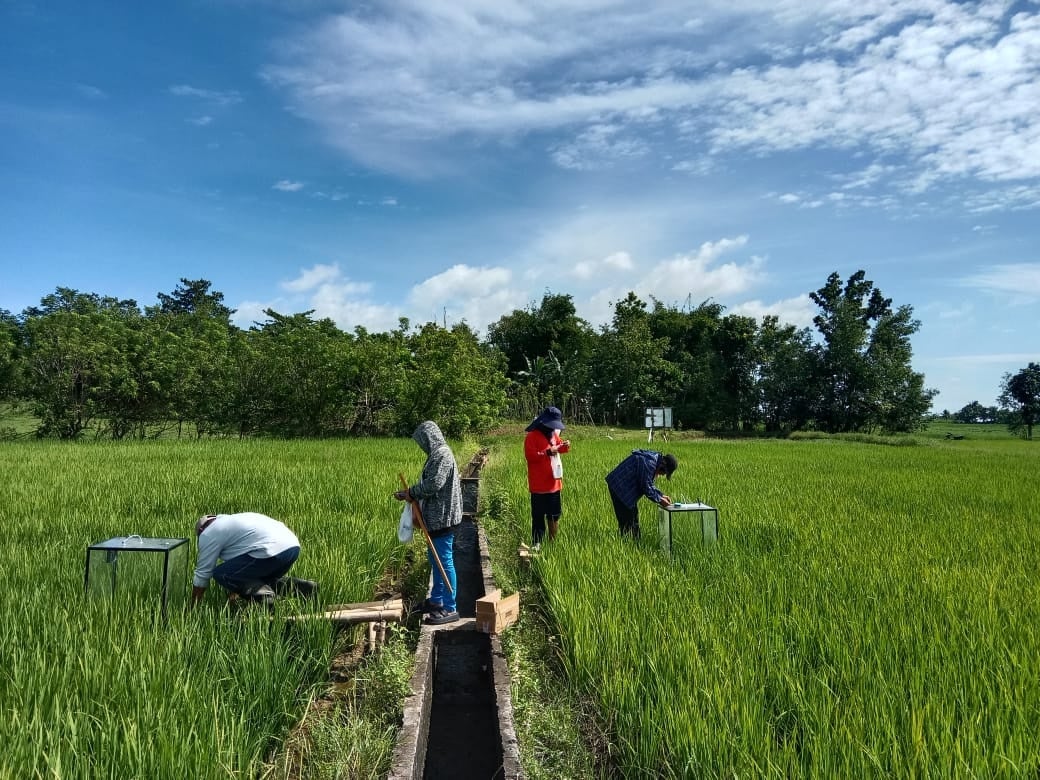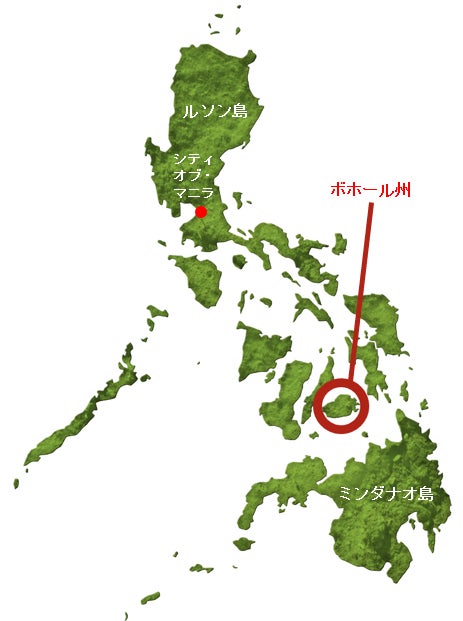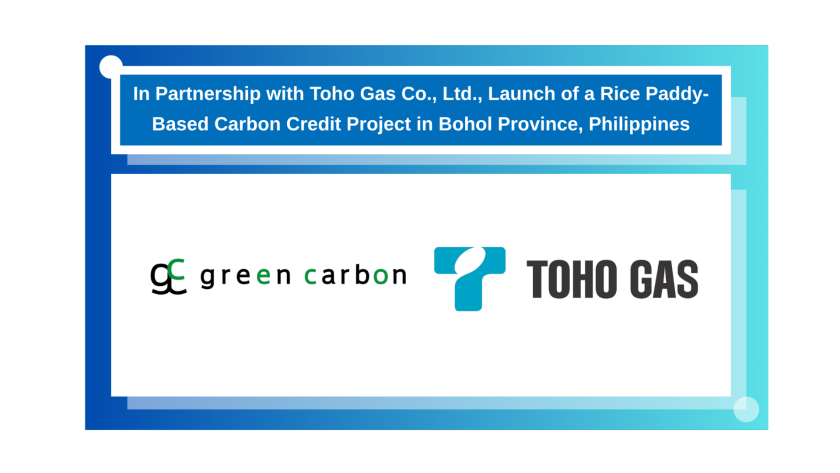~ First initiative by a Chubu-based company. Partnership with Visayas State University aims to create credits under the Joint Crediting Mechanism (JCM) ~
Green Carbon Inc. (CEO: Jun Okita, hereinafter “Green Carbon”), a company developing and selling nature-based carbon credits, is pleased to announce the launch of a joint demonstration project with Toho Gas Co., Ltd. (President & CEO: Satoshi Yamasaki, hereinafter “Toho Gas”) in Bohol Province, Central Visayas, Philippines, aimed at generating rice paddy-derived carbon credits (hereinafter “this project”). This initiative utilizes the methodology of the Joint Crediting Mechanism (JCM)(※1) to promote climate change mitigation while contributing to local community development.
This is the first initiative by a Chubu-based company to generate rice paddy carbon credits under the JCM(※2).
〇For inquiries regarding this press release and for further details, please contact:
〇To download Green Carbon Co., Ltd.’s company profile, please visit:
◆Background of the Collaboration
The Project targets Bohol Province in the Central Visayas region, aiming to generate carbon credits through the reduction of methane emissions from rice paddies using Alternate Wetting and Drying (AWD) irrigation(※3). Bohol Province, with top-class agricultural land potential in the Central Visayas (second only to Negros Oriental), will start a pilot program during the 2025 rainy season. Over the next 10 years, the Project plans to expand to over 10,000 ha, aiming to reduce approximately 430,000 t-CO2 equivalent.
◆Regional Features and Project Significance
Bohol Island enjoys a monsoon climate, with about 45% of the island’s land used for agriculture and roughly 80% of the population engaged in farming. The Project will focus on major rice-growing areas, including Ubai, Pilar, Dagohoy, San Miguel, and Carmen, targeting large-scale credit generation.
The Project not only contributes to Japan’s decarbonization efforts, but through the JCM, it also provides local farmers with new income opportunities. Additionally, by promoting sustainable agricultural practices, it supports environmental conservation in the region.
Ubai City, selected as the pilot site, is the largest agricultural hub in Bohol, with over 8,000 ha of cultivated land. Supported by the provincial government, the Bohol Organic Agricultural Technology Center (BOATech) conducts cultivation of native crops and advanced agricultural experiments.


<Visayas State University>
Established in 1924 as an agricultural school, Visayas State University is one of the Philippines’ leading national universities. It specializes in sustainable agriculture research and rural development. In this Project, the University plays a key role in data analysis using its specialized knowledge and demonstration facilities.
○Website: https://www.vsu.edu.ph/
◆Roles of Each Company
| Green Carbon | ・Project operation and management ・Implementation of its in-house system, Agreen, to digitize data and emission management (DX) |
| Toho Gas | ・Project support, procurement, and utilization of the generated credits |
◆Future Outlook
Green Carbon is engaged in nature-based carbon credit generation across Southeast Asia, covering projects in forest conservation, rice paddies, mangrove planting, cattle methane reduction, and biochar. In the Philippines, the company focuses on JCM projects for methane reduction through AWD in rice paddies, developing projects based on methodologies approved in early February 2025.
In Japan, JCM credits are now eligible for use in offsetting corporate emissions exceeding their allowances under the GX-ETS(※4), and demand is expected to increase further. Green Carbon aims to secure economic feasibility, contribute to Japan’s decarbonization, and enhance the income of local farmers.
※1: Joint Crediting Mechanism (JCM)
A system in which Japan and a partner country cooperate to reduce or absorb greenhouse gases, sharing the quantified reductions or absorptions between both countries. In Japan, the quantified reductions/absorptions can be utilized as carbon credits. The Japanese government aims to secure approximately 100 million t-CO2 cumulatively by FY2030 and approximately 200 million t-CO2 by FY2040.
※2: According to Toho Gas
※3: Alternate Wetting and Drying (AWD)
AWD is an irrigation method where rice paddies are alternately flooded and allowed to dry naturally every few days. Compared to continuous flooding, AWD reduces water usage and contributes to water conservation.
※4: GX-ETS
A Japanese emissions trading system under the growth-oriented carbon pricing initiative, allowing companies to trade emissions allowances and reduce emissions within government-set limits.
◆Green Carbon Inc.
Representative: Jun Okita, CEO
Head Office: PREX North 9F, 2-3-2 Kojimachi, Chiyoda-ku, Tokyo, Japan
Established: December 12, 2019
Business Activities: Development and sale of carbon credits, agriculture-related projects, environmental projects, other related businesses, and ESG consulting
Website: https://green-carbon.co.jp/en/
◆Toho Gas Co., Ltd.
Representative: Satoshi Yamasaki, President & CEO
Head Office: 19-18 Sakurada-cho, Atsuta-ku, Nagoya, Japan
Established: June 26, 1922
Business Activities: Gas and electricity business
Website: https://www.tohogas.co.jp/
◆About Green Carbon
Guided by the vision “Harnessing the power of life to save the Earth,” Green Carbon develops and supports projects that generate, register, and sell nature-based carbon credits both in Japan and abroad. The company is also engaged in agriculture-related businesses, R&D initiatives, and ESG consulting.
Its business activities span Japan, Southeast Asia, Australia, and South America, creating credits from rice paddies, biochar, forest conservation, carbon farming, mangrove planting, and cattle methane reduction. In Japan, Green Carbon obtained certification in FY2023 for the country’s first and one of the largest-scale rice paddy J-Credit projects (approx. 6,220 t). In FY2024, the company plans to expand this initiative to around 40,000 ha (approx. 80,000 t).
Green Carbon also provides Agreen, a one-stop platform service that streamlines the entire process of credit registration, application, and sales. By simplifying procedures and documentation, the service reduces the administrative burden on credit creators.

